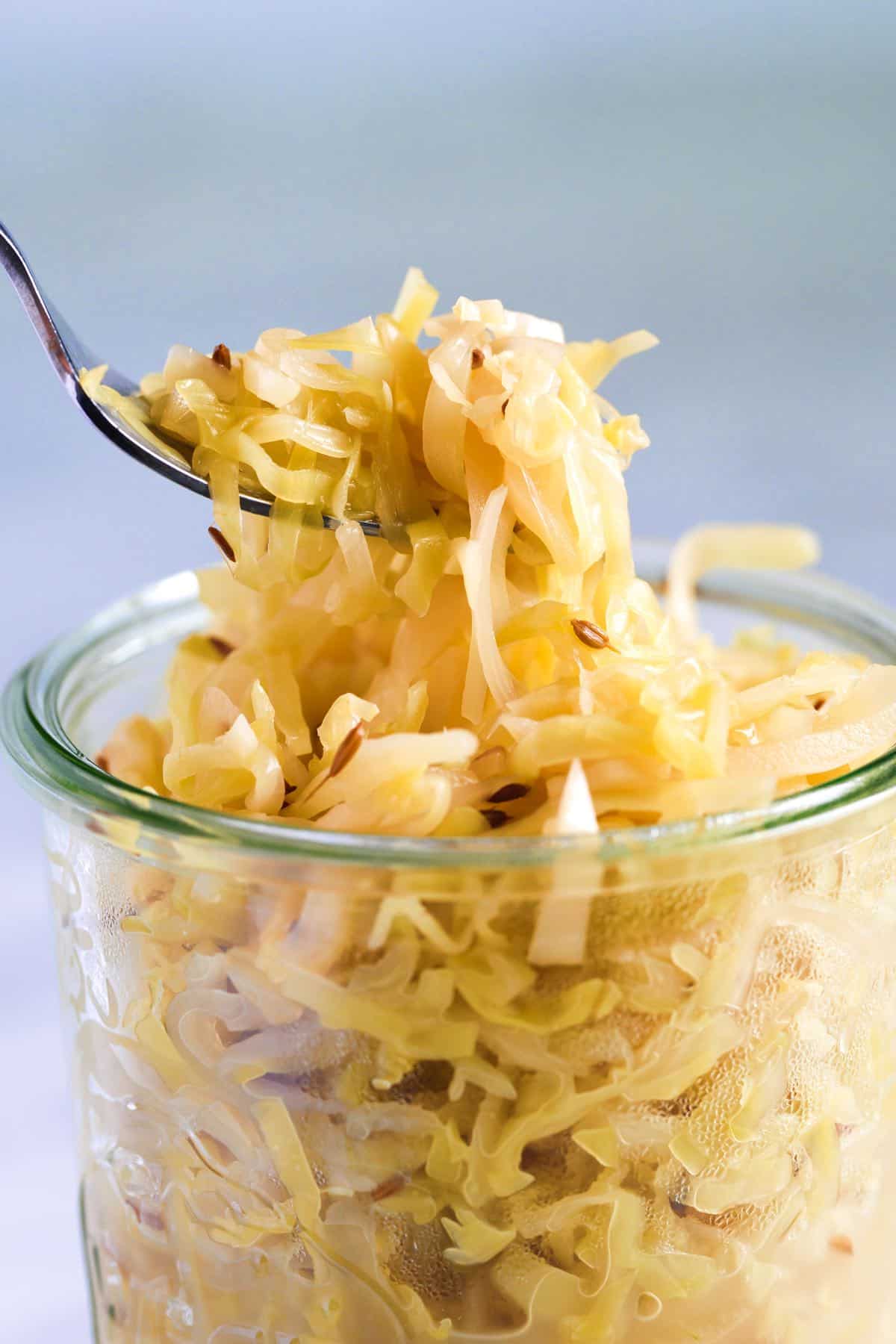Sauerkraut, a fermented cabbage dish, has gained popularity for its culinary delights and health benefits. Its tangy flavor and crunchy texture have made it a favorite among food enthusiasts and health-conscious individuals alike. Let’s delve into the world of German sauerkraut and uncover its culinary and nutritional wonders.
Is sauerkraut safe to eat? Can it be a part of a balanced diet? Let’s explore the answers to these questions and more as we unravel the story of German sauerkraut.
German sauerkraut is a fermented dish made from finely shredded cabbage that undergoes lactic acid fermentation. This fermentation process gives sauerkraut its distinctive sour flavor and preserves it naturally. Sauerkraut is primarily associated with German cuisine, where it often accompanies hearty meat dishes.
In summary, sauerkraut is a culinary delight that offers a range of health benefits, including improved digestion, boosted immunity, and reduced inflammation. Its versatility makes it a great addition to salads, sandwiches, soups, and stews. Whether you’re looking to enhance your culinary experience or improve your well-being, German sauerkraut deserves a special place in your kitchen.
German Sauerkraut: A Personal Journey into Culinary Delight and Health Discovery
My first encounter with sauerkraut was at a traditional German restaurant. The tangy aroma and crisp texture intrigued me, and I couldn’t resist trying it. From that moment, I was hooked. Sauerkraut’s unique flavor and versatility quickly made it a staple in my diet.
As I delved deeper into the world of sauerkraut, I discovered not only its culinary appeal but also its impressive health benefits. The lactic acid fermentation process produces probiotics, beneficial bacteria that support gut health and boost immunity. Probiotics have been linked to improved digestion, reduced inflammation, and a stronger immune system.

Vegan Sauerkraut Soup with Mushrooms inspired by German Sauerkraut Soup – Source cultured.guru
German Sauerkraut: A Culinary Journey through History and Myth
The origins of sauerkraut can be traced back to ancient China, where it was believed to have medicinal properties. It was introduced to Europe by traders and became a staple food in many cultures, particularly in Germany, where it gained prominence as a national dish.
Throughout history, sauerkraut has played a significant role in folklore and mythology. In German folklore, it is said that eating sauerkraut on New Year’s Day brings good luck and prosperity. Additionally, sauerkraut has been associated with sailors due to its ability to prevent scurvy during long sea voyages.

Original German Sauerkraut Recipe | Traditional German Side Dish – Source www.pinterest.com
German Sauerkraut: Unlocking the Hidden Secrets of Fermentation
The secret behind sauerkraut’s unique flavor and health benefits lies in the fermentation process. Lactic acid bacteria (LAB) convert the natural sugars in cabbage into lactic acid, giving sauerkraut its characteristic sour taste. This fermentation process also produces beneficial enzymes, vitamins, and probiotics.
Probiotics are live microorganisms that have been shown to have positive effects on human health. They support the growth of good bacteria in the gut, which aids in digestion, boosts immunity, and reduces inflammation.

Texas Best German Sauerkraut 16oz – TexasBestShop – Source texasbestshop.com
German Sauerkraut: A Culinary Adventure of Flavors and Textures
Sauerkraut is a versatile ingredient that can be enjoyed in various ways. It can be served raw as a side dish, or it can be cooked in soups, stews, and casseroles. Sauerkraut can also be used as a topping for hot dogs, sausages, and sandwiches.
The tangy flavor of sauerkraut pairs well with rich and fatty meats, such as pork, duck, and goose. It also complements sweet and sour dishes, such as applesauce and red cabbage. Additionally, sauerkraut can be used to make savory pies, dumplings, and salads.

Bavarian Sauerkraut Where Is My Spoon – Source whereismyspoon.co
German Sauerkraut: A Balancing Act of Health and Flavor
Sauerkraut is a low-calorie food that is high in fiber and vitamin C. It is also a good source of probiotics, which are beneficial bacteria that support gut health. The fermentation process involved in making sauerkraut produces lactic acid, which gives it its characteristic sour flavor and also helps to preserve it.
Sauerkraut is a versatile food that can be enjoyed in many different ways. It can be eaten raw, cooked, or pickled. It can be added to salads, sandwiches, soups, and stews. Sauerkraut can also be used as a topping for hot dogs and sausages.

German Sauerkraut Balls | Recipe | Sauerkraut, Appetizer recipes, Still – Source www.pinterest.com
German Sauerkraut: Tips for Maximizing Health Benefits
When choosing sauerkraut, look for brands that are labeled “lacto-fermented.” This ensures that the sauerkraut has been fermented naturally, without the addition of preservatives or vinegar.
Sauerkraut can be stored in the refrigerator for up to 6 months. Once opened, it should be consumed within 2 weeks.
To maximize the health benefits of sauerkraut, eat it fermented rather than cooked. This is because cooking can destroy the probiotics that are responsible for the health benefits of sauerkraut.
:max_bytes(150000):strip_icc()/GettyImages-121863559-56a36ef13df78cf7727d59e0.jpg)
German Sauerkraut Cooked With Wine (Weinkraut) Recipe – Source www.thespruceeats.com
German Sauerkraut: Exploring the Health Frontiers
Sauerkraut has been shown to have a number of health benefits, including:
- Improved digestion
- Boosted immunity
- Reduced inflammation
- Lowered cholesterol
- Reduced risk of cancer
German Sauerkraut: Fun Facts to Savor
Sauerkraut is a popular food in Germany, where it is often served with pork or sausages.
Sauerkraut was once used as a currency in Germany.
Sauerkraut is a good source of probiotics, which are beneficial bacteria that support gut health.
Sauerkraut can help to lower cholesterol and reduce the risk of cancer.

German sauerkraut recipe – Artofit – Source www.artofit.org
German Sauerkraut: A Culinary Masterclass
To make sauerkraut, finely shred cabbage and then mix it with salt and water. The mixture is then fermented in a sealed container for several weeks. The fermentation process produces lactic acid, which gives sauerkraut its characteristic sour flavor.
Sauerkraut can be used in a variety of dishes, including salads, soups, and stews. It can also be served as a side dish.

Kimchi Vs. Sauerkraut: SPICEography Showdown – Source www.spiceography.com
German Sauerkraut: Exploring the Unknown
What if sauerkraut could do more than just add flavor to your meals? What if it could also improve your health?
That’s the promise of sauerkraut, a fermented cabbage dish that has been shown to have a number of health benefits, including improved digestion, boosted immunity, and reduced inflammation.
The secret to sauerkraut’s health benefits lies in the fermentation process. When cabbage is fermented, it produces lactic acid, which is a natural preservative that also has a number of health benefits.
/homemade-german-sauerkraut-1447249-hero-01-177ee24d1a0d41db963bddea8478435f.jpg)
Homemade German Sauerkraut Recipe – Source www.thespruceeats.com
German Sauerkraut: A Culinary Delight in Every Bite

Sauerkraut – Rezepte Suchen – Source www.rezeptesuchen.com
Question and Answer: German Sauerkraut
Q: Is sauerkraut healthy?
A: Yes, sauerkraut is a healthy food that is high in probiotics, vitamin C, and fiber.
Q: What are the health benefits of sauerkraut?
A: Sauerkraut has a number of health benefits, including improved digestion, boosted immunity, reduced inflammation, lowered cholesterol, and reduced risk of cancer.
Q: How do I make sauerkraut?
A: To make sauerkraut, finely shred cabbage and then mix it with salt and water. The mixture is then fermented in a sealed container for several weeks.
Q: What is the difference between raw sauerkraut and cooked sauerkraut?
A: Raw sauerkraut is fermented but not cooked. Cooked sauerkraut is fermented and then cooked.
Conclusion of German Sauerkraut: A Culinary Delight With Health Benefits
Sauerkraut is a delicious and healthy food that can be enjoyed in many different ways. It is a good source of probiotics, vitamin C, and fiber. Sauerkraut has a number of health benefits, including improved digestion, boosted immunity, reduced inflammation, lowered cholesterol, and reduced risk of cancer.



